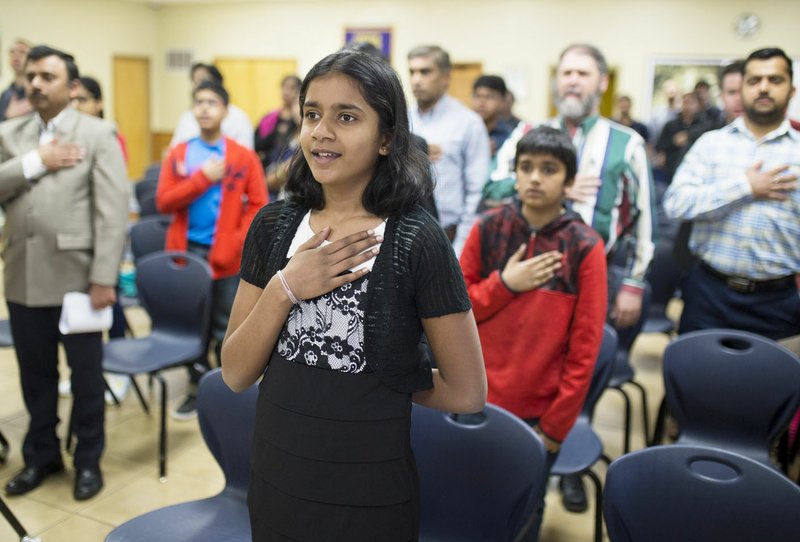CENTERTON -- Vanshika Chintakunta dreams of going to college, becoming a doctor and opening a medical office in the United States.
But she's different from many immigrant dreamers: She came to America legally. Still, her immigration status diminishes her hope of achieving those goals.
Vanshika, a ninth-grader at Bentonville High School, moved to the United States from India when she was 3 through her father's work visa. Her sister, Trishika, was 5 months old.
The girls and their parents have been waiting for their green cards since they applied nearly a decade ago, Vanshika said. If a green card comes for one of them, it comes for all of them, unless Vanshika and Trishika already have turned 21.
Vanshika, 14, and Trishika, 11, will be forced to leave the country if they do not get a green card before they turn 21, the age at which they'll no longer qualify for the H-4 dependent visa.
Vanshika fears it could be decades before her green card comes, given the huge backlog of Indian applications. The thought of leaving saddens and scares her.
"America is the only home I've ever known. I've lived here all my life, and I want to continue to be a part of American society," she said.
Vanshika was one of several area residents who spoke at a March 17 event at Centerton City Hall to raise awareness of the plight she and many other Indian immigrants share.
If she decides to attend a U.S. college or university, she'd be considered an international student. That's significant because many colleges and universities, including the University of Arkansas, Fayetteville, charge a higher tuition rate for international students than for U.S. citizens. Vanshika and others also complain that finding ways to pay for college is more challenging for international students than it is for others.
"Any financial aid tied to federal money, if you're not a U.S. citizen or permanent resident, you're not eligible for it," said Karl Anderson, assistant director for international student recruitment at the University of Arkansas.
The U.S. Department of Education provides more than $120 billion in federal grants, loans and work-study money each year to more than 13 million college and career school students, according to the Federal Student Aid office's website.
The University of Arkansas, like many schools across the nation, does offer scholarships that are available to all undergraduate students regardless of where they come from, Anderson said.
Green card backlog
It's uncertain how many Indian nationals live in Northwest Arkansas, but the 2010 Census showed 3,523 Asian Indians living in Benton and Washington counties, five times the number recorded during the 2000 Census.
The U.S. immigration debate in recent years has focused on those coming from Latin America and especially how to handle "Dreamers," those brought to the country illegally by their parents when they were children.
The Centerton event highlighted a lesser-known story. Those gathered included Indian adults and children, many of whom moved to the United States legally and remain here legally on employment-based visas.
A green card -- officially known as a permanent resident card -- allows a person to live and work permanently in the United States.
About a million immigrants receive green cards each year. Employment-related categories, including workers' family members, accounted for 14 percent of 2015 green cards, according to the Pew Research Center, a nonpartisan fact-finding organization based in Washington.
The green card backlog among the Indian population was created by an allocation system that's inconsistent with how employment-based visas are allocated. While there is no per-country limit to awarding employment-based visas related to skill, a maximum of 140,000 employment-based green cards are awarded annually.
No country -- no matter its size -- may receive more than 7 percent, or 9,800 of those 140,000 green cards. Nationally, about 300,000 high-skilled immigrants and their families from India are stuck in the green card backlog, according to GC Reforms, an organization focused on creating awareness about immigration challenges faced by Indian high-skilled workers.
Those here on employment-based visas applying for a green card today will have to wait decades for a green card at the current issuance rate, according to GC Reforms.
The majority of Indian immigrants to the United States are highly educated and have strong English skills, according to the Migration Policy Institute, an independent, nonprofit think tank that analyzes the movement of people worldwide. Many have careers related to science, technology, engineering and math, fields that have a high demand for employees.
Pending legislation
Caroline Tabler, communications director for U.S. Sen. Tom Cotton, R-Ark., said the senator is well aware of the green card backlog.
Cotton co-sponsors legislation called the Reforming American Immigration for Strong Employment Act, or RAISE Act, that would lift country caps on green cards and shift to more of a merit-based system for disbursal, Tabler said.
"On the RAISE Act, we've met with a lot of Indian-American groups from Arkansas, and they're very supportive of that legislation," Tabler said. Cotton sees his legislation as a solution that would help the Indian population, she said.
The bill aims to reduce overall immigration by half and eliminate the diversity visa lottery, which provides 50,000 visas to countries that send relatively few immigrants to the United States. Countries that have had more than 50,000 natives immigrate to the United States in the past five years are ineligible for the diversity lottery.
The bill also would cap the number of refugees given permanent residency at 50,000 per year and eliminate the ability of immigrants to sponsor visas for extended family members and adult children.
The RAISE Act was introduced last year and was referred to the Committee on the Judiciary. President Trump has announced his support of it. Top congressional Democrats have panned the bill, with House Democratic leader Nancy Pelosi calling it part of an "anti-immigrant agenda" on Trump's part.
Cotton isn't the only one who has introduced legislation on the issue.
The Immigration Innovation Act and the Fairness for High-Skilled Immigrants Act, both introduced since last year, would increase access to employment-based green cards for high-skilled workers. Neither one has advanced past committee yet, but some technology industry leaders have voiced their support.
Brad Smith, president and chief legal officer for Microsoft, wrote in a blog post in January the Immigration Innovation Act would eliminate bottlenecks in the green-card process for high-skilled workers.
Current per-country limits on employment-based green cards are arbitrary and "create uncertainty and tremendous hardship for our employees and their families as they endure decades-long backlogs," Smith wrote. "This uncertainty is also not good for American businesses that want to retain this valuable talent in the country."
Walmart did not respond to two requests for comment submitted through the company's website last month.
Sara Lasure, a spokeswoman for Sen. John Boozman, R-Ark., said Boozman has heard from Arkansans who are concerned about the length of time it takes to process green cards, and he understands the importance of highly skilled immigrants to the state's employers. He is following legislative proposals to reform the system, she said.
Forced to leave
Paul Thella, a financial analyst for Cognizant, moved to Bentonville from India on an employment-based visa in 2013. The U.S. government approved his green card application, which his employer filed. The big question, because of the backlog, is when the green card will come.
"We don't know," he said.
U.S. Citizenship and Immigration Services renewed Thella's visa in 2015, but declined to renew it this year. He said his case was rejected because his skill is not "specialized." Thella therefore moved to Canada on a work permit last week with his wife and 10-month-old daughter, who is a U.S. citizen.
Thella said he'll maintain his job and work while he's living in Canada, but it will be at least six months before he's allowed back in the United States.
Thella and other skilled employees on work visas say they pay taxes and wish to invest more of their money in America. But some postpone big-ticket purchases such as houses and cars because they can't be certain how long they will be allowed to stay.
Employees also aren't free to change jobs because their visas are tied to their employers, Thella said.
Sunny Ledalla, 15, of Bentonville came to the United States from India in 2005. The West High School sophomore said she has a 4.3 grade point average. She, like Vanshika, would like to pursue a medical career in the United States.
Sunny recalled when she took the Preliminary SAT, she had to check the box indicating she is an international student, an odd feeling considering she's lived in the United States since she was 2. International students don't qualify for the National Merit Scholarship program, an academic competition for recognition and scholarships that starts with taking the Preliminary SAT.
Pramod Ledalla, Sunny's father, said he would buy a house and put more into the U.S. economy if he obtained a green card and the sense of stability that comes with it.
"Think about people like me all over the U.S. who are ready to spend," he said.
State Rep. Dan Douglas of Bentonville attended the Centerton event, which he said opened his eyes to a problem.
"To me it is appalling," Douglas, a Republican, told the crowd. "I have grandchildren who were born here and are citizens of the U.S. But you all are no less citizens than they are, except on paper. This is your country and shame on us for not addressing this."
Douglas pointed out he's a state representative, and the green card issue is a federal one. Still, he pledged to do what he could to help, adding if he's re-elected this fall, he would organize a meeting in Little Rock and invite fellow legislators and the governor to hear their stories.
Scott Richardson, a Bentonville resident running against Douglas in this year's Republican primary election, did not attend the Centerton event but responded in an email. He wrote he's well aware of the immigration issues natives of India are facing. A college friend dealing with a similar issue was required to return to his home country of Pakistan, he wrote.
He sympathizes with those young people facing the possibility of deportation when they turn 21 and believes steps should be taken to help those whose work is positively affecting the U.S. culture and economy. But pushing that agenda at the state level is unlikely to result in getting them the help they need; instead, he would lobby federal representatives to change the system, he wrote.
NW News on 04/08/2018



